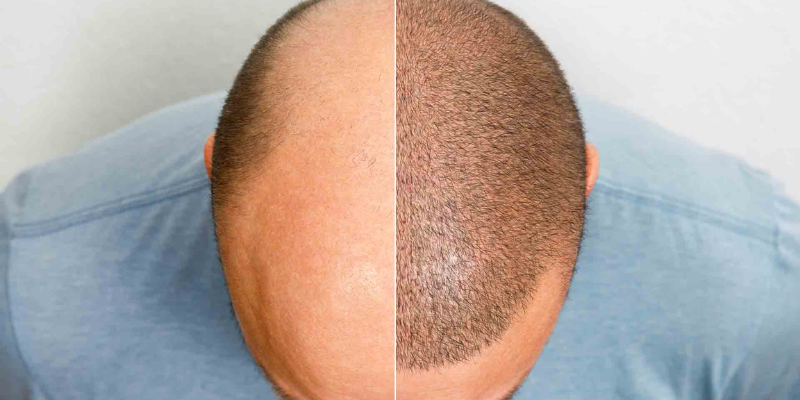How Long After Hair Transplant Laser?
How long after hair transplant laser? Laser hair removal is often thought of as a way to get rid of hair for good. On the other hand, laser treatment for hair loss is becoming more and more popular as a medical treatment. Some other names for it are hair laser, red light therapy, and cold laser therapy. It also involves treating the scalp with a low-level laser. Then, it is possible for lost hair to grow back and for lifeless hair strands to get stronger.
So, it might be annoying to see your hair falling out on your pillow or in the shower drain. The good news is that it’s normal to lose up to 100 hairs a day. But if you keep losing hair and it doesn’t grow back, you’re in trouble. Even though age and genetics are the most common causes of hair loss, things like hormone imbalances can also cause a lot of hair to fall out. In this case, the best thing to do is figure out why the hair is falling out. But what if the procedure doesn’t work and your hair doesn’t grow back?
How Long After Hair Transplant Laser Treatment For Hair Loss?
In this case, you might want to try getting a hair transplant or low-level laser treatment for hair growth. Everyone knows how the hair transplant surgery works. Most people, however, don’t know about hair lasers. Hair laser is a way to stop hair from falling out and grow back. Low-level laser therapy is also used as a part of this treatment to help hair grow on the scalp. If this strategy seems interesting at first, keep reading to learn more about its pros and cons.
Laser hair removal is probably something you’ve heard of before. In this process, a low-level laser treatment for hair growth is put on the scalp, and weak cells take it in. By doing this, it is hoped that blood flow to the scalp will improve and more nutrients will get to the hair follicles. All of this makes for the best environment for hair growth. To put it another way, getting rid of hair with a laser is like giving plants water. The way that plants take in water and food is the same way that hair follicles take in light energy.
So, the hair might grow on its own. As the light is taken in, the microcirculation gets bigger. This lets more blood and nutrients get to the hair follicle. Low-level laser treatment can help hair grow. It also increases cell activity in the hair follicles to stop hair loss. Once you know what a hair laser is and what it does, the question is whether or not it works.
Does Hair Loss Treatment Work?
With low-level laser therapy for hair growth, you can’t be sure that your hair will grow back. But some scientific research has given us reasons to be hopeful. A 2014 study showed that low-level laser therapy for hair growth is both safe and helpful. In another study done in 2013, 41 people who were losing their hair took part in a 16-week study. Surprisingly, laser therapy caused hair growth to increase by 39% in the people who tried it. Even though some scientific studies have shown that laser hair removal is effective, not everyone can benefit from it. Whether or not the technique works for a person depends on a lot of different things.
So, this method might give your friend thick hair, but it might not work for you. Before getting a hair laser, it’s a good idea to think about the pros and cons of the procedure. Also, if you send in the application and don’t get the result you want, you should think about how this might affect you. Low-level laser therapy for hair growth is, in fact, an expensive way to treat hair loss.
Pros And Cons Of Hair Loss Laser Treatment
Even though the hair laser’s major drawback is that it can’t promise 100% accurate results, it does have some benefits that may help people who are losing their hair. Laser hair removal, for example, doesn’t hurt, doesn’t make you bleed, and doesn’t have any bad side effects. Compared to a hair transplant, which is another option, this is a big plus. It doesn’t hurt at all. There are no bad consequences. It can be worn by both men and women. Hair that is already there gets thicker. The procedure doesn’t hurt.
The upsides of therapy are nice to know about, but you don’t want to know about the downsides. No one can say for sure if your hair will grow back. To see results, treatment may have to go on for a few months, with up to a few sessions a week, and it’s very expensive.
Low-level laser photons are sent to the scalp as part of the procedure. The therapy is meant to improve blood flow and increase cell activity in the hair follicles in the affected area. With this application, which is often called a “red light hair treatment,” lost hair can grow back, lifeless hair can come back to life, hair loss can be stopped, and hair can grow faster.
Laser hair transplantation doesn’t leave a scar, and this method has also made physiological evaluation, or oxygenation, lower. When hair is transplanted, the transplanted hair follicles get less blood, which makes them live longer. This keeps the hair healthy and looking like it should. Because of how often micrografts have been used in this procedure, the spaces between the grafts have gotten bigger. This leads to a more even and balanced spread of hair.
Can You Combine Laser Treatment With Hair Transplant?
Low-level laser therapy for hair growth doesn’t hurt because it doesn’t involve making an incision. While getting low-level laser therapy for hair growth, people can even read magazines or newspapers. Laser therapy is also the fastest, safest, and most effective way to care for your hair that is available today. You can use a hair laser by itself or with other treatments like intradermal treatment and mesotherapy. With low-level laser therapy for hair growth, you can get results in a fraction of the time. Laser therapy is different from other treatments because it helps people with too much white hair get rid of it.
How Long After Gastric Sleeve Can I Have Sex Without Harming Myself?
Is there a definite answer to “how long after gastric sleeve can I have sex?” There is no definitive answer to this question, as it depends on the individual’s healing process and recovery. However, it is generally recommended that people wait at least 4-6 weeks after surgery before engaging in sexual activity. This gives the body time to heal and avoid any complications. Additionally, it is important to be aware that sex may feel different after surgery due to changes in the stomach and intestines. Therefore, it is important to communicate with your partner when answering, “how long after gastric sleeve can I have sex?” and go at a comfortable pace for both of you
It is also important to listen to your body and take things slowly, as you may still be feeling fatigued from surgery. They can give you more specific advice based on your individual case. Gastric sleeve surgery is a major operation, and it is important to ensure you are fully recovered before engaging in any strenuous activity, including sex. Please consult with your surgeon or medical team for more specific advice regarding when it is safe for you to resume sexual activity.
If you have any other questions, such as “can I drink alcohol after gastric sleeve?” you can keep on reading our blog.



